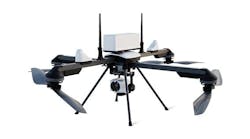Unmanned aerial drones may best be known for flying over the skies of Afghanistan, providing military intelligence or launching attacks against suspected terrorists.
But Middle Tennessee State University is banking on drones being the next big thing in commercial business.
MTSU's Department of Aerospace is revving up to offer a new program on drone technology, focusing heavily on commercial uses of the small, unmanned aircraft in nonmilitary settings.
MTSU is one of only 17 colleges or universities in the nation approved by the Federal Aviation Administration to use drone technology. The program is sponsored by the U.S. Army, Department of Defense and NASA, which is funding the program in return for faculty doing aeronautic research for the government. Students would come away with an aerospace degree with a concentration in unmanned aerial systems.
The curriculum, which is still being formulated, will emphasize agricultural uses of small drones that could be set up to scan crops for pests, nutrients and water, a practice that has been studied by researchers in Arkansas, Florida, Ohio and Oregon.
"We're tapping our other applied sciences across campus, whether it's looking at environmental health for contamination, pollution spreading, understanding more atmospheric research ... these are some of the other applications," said Kyle Snyder, director of the Unmanned Aerial Systems Program at MTSU. "The intent is not to produce the next (Unmanned Aerial Systems) soldier. The military schools can handle all that."
FEARS RAISED
The university maintains students won't be involved in military training or research -- faculty will perform the research on drone airworthiness, airspace management and improving remote technology. But opposition to the program is slowly building, with worries about how drone technology could be used against U.S. civilians. Indeed, MTSU has worked with Nashville Metro police, which has acquired two drones of its own for surveillance.
"Already police forces are getting drones. They have all kinds of drones. They have drones that can carry armaments," said Elizabeth Barger, Tennessee coordinator for Code Pink and a board member with Nashville Peace and Justice, social justice groups that are preparing a "strong response" to MTSU's drone program. "It's a further militarization of our civilian police services. The idea that we are being watched all the time is very un-American to me."
Snyder said public pronouncement in August, when MTSU signed its agreement with the Army -- the first in the nation -- that the program would be a military recruiting tool, "was inaccurate at the time" and that while some students could go on to contract with the military after graduation, most are more likely to go into the private sector.
MTSU's two drones consist of a quadcopter -- a helicopter with four sets of rotors -- and a small airplane model the university can equip with special sensors for agricultural use.
Contact Brian Haas at 615-726-8968 or bhaas@ten nessean.com.
The university last week put in an application with the FAA to fly the drones over the school's farm at 3001 Guy James Road in Lascassas. Faculty have been flying drones at ISR Group in Savannah, Ga., a company that manufactures the machines and has partnered with MTSU.
"One of the things we're looking at and hopefully maybe doing some of the research this fall on the farm is plant health. Are the plants getting enough water, are they infested with pests, are they prime for harvesting at this point?" Snyder said. "If you've got that aerial imagery, you can look at it daily or weekly. A 2 percent increase in yield turns into millions of dollars on the backside."
Snyder said the drones would be most useful on large farms, where they could not only increase the accuracy of determining crops' needs but also save time for farmers who would otherwise have to manually inspect plants.
Before they can pilot the drones, students first must obtain a commercial pilot's license, which can be done in a semester at MTSU. Coursework will include programming, engineering and research into the history and current uses of drones. Still, Snyder hopes to have students piloting a Prioria Robotics Maveric drone over the MTSU farm by late summer or fall.
DEPLOYMENT LIMITED
Metro police have trained with MTSU researchers in Savannah, Ga., with two Draganflyer X6 three-rotor drones, though they haven't been put to official use. Lt. Floyd Hyde, with the department's Special Operations Division, said the drones were bought with Homeland Security grant money and will only be used in homeland security-related or emergency incidents in areas already secured.
"We understand the concerns of all the people about Big Brother watching," Hyde said. "The primary purpose for the purchase of ours was to increase the surveillance around critical infrastructure ... that would be of interest to terrorists."
Hyde declined to say what critical targets the department has in mind. He said the drones would never be flown over populated areas and would only be used in areas, like in a SWAT standoff, where police have already cordoned off the area. Still, such technology worries privacy advocates.
"Privacy protections must be put in place to ensure that the drone technology does not create a surveillance society, in which our every move is monitored, tracked, recorded, and investigated by law enforcement," said Hedy Weinberg, executive director of the American Civil Liberties Union of Tennessee. "Use of drones by law enforcement, without stronger privacy protections, could easily lead to fishing expeditions and invasive, all-encompassing surveillance that would seriously erode our privacy rights."
Snyder said those concerns will be included in the course curriculum. But his goal is to teach students to develop commercial uses of drones and be on the cutting edge of business technology. While drone usage is heavily restricted by the FAA, the agency plans to open up civilian airspace to some small drones by 2015.
Copyright 2012 Chattanooga Publishing Company

